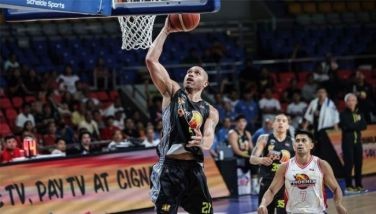PBA views reflect strong Cignal

The numbers were a testament to not only the PBA’s popularity beyond traditional viewing but also Cignal/TV5’s expanding reach as a multi-platform network. Cignal TV vice president for channels and content Sienna Olaso said the other day every game in the recent Philippine Cup Finals delivered over a million views on the PBA Rush/FIBA livestream. The average was about 700,000 during the eliminations and quarterfinals then rose to 900,000 for the semifinals in the Clark bubble.
For Game 1, there were 1.9 million views; Game 2, 1.5 million; Game 3, 1.3 million; Game 4, 1.4 million and Game 5, 1.4 million. FIBA’s hook-up was critical as it monitored the conference closely to determine the feasibility of holding some games of the third Asia Cup qualifying window under the same Clark bubble conditions. It’s no wonder that FIBA later awarded the hosting rights to Groups A and C involving eight teams in the Clark bubble on Feb. 18-22.
“We’re proud of hosting the coming window and we’re proud of the success of the PBA bubble,” said SBP president Al Panlilio. “The NBA was the benchmark and we did a similar feat, including the participation of virtual fans, for nine weeks. We were powered by Smart 5G all the way. We have a good relationship with FIBA. Our SBP chairman emeritus MVP (Manny V. Pangilinan) is a member of the FIBA Central Board. When FIBA called to consider us as host of the coming window, it wasn’t only for Group A but also for Group C. With Sec. Vince Dizon, IATF, CDC, DOH and PBA, we will make the window a showcase of our hospitality, efficiency and safety protocols.”
The viewing figures in the PBA Finals are expected to hit the roof when the window opens. The Philippines will play thrice, first against South Korea on Feb. 18 then Indonesia on Feb. 20 and finally, South Korea in a rematch on Feb. 22. The Koreans skipped the second window and will make up for the absence by playing four games in five days. FIBA decided not to penalize South Korea for failing to show up in the second window in Bahrain. In the first and second windows, FIBA cancelled 15 games because of the pandemic. Japan, Malaysia and China missed three contests each.
The FIBA Asia Cup is a once-in-four-years continental or zonal championship which isn’t a qualifier for either the Olympics or World Cup. The winner will be recognized as the Asian king of hoops. It used to be known as the Asian Basketball Confederation championships, inaugurated in 1950. The coming tournament is the 30th edition to be staged in Jakarta on Aug. 17-29 next year. The Philippines last won the crown in 1985 with coach Ron Jacobs at the helm.
An initial list of 35 countries was drawn up to participate in eliminations for the next FIBA Asia Cup. Struck out in the early going were United Arab Emirates, Oman, Brunei, Cambodia, Maldives, Bhutan, Nepal, Bangladesh, Fiji, Singapore and Macau, leaving 24 to battle in the six-group qualifiers. The Philippines is in Group A with South Korea, Indonesia and Thailand. The top two finishers of each bracket will advance to the FIBA Asia Cup. Then, the third placers of each group slug it out in a mini-tournament to determine the last four slots in the 16-team FIBA Asia Cup. As host nation, Indonesia is guaranteed a place in the tournament. If it finishes in the top two of Group A, then the mini-tournament for third placers will be for four slots. If Indonesia does not finish in the top two, only three slots will be available in the mini-tournament because one ticket will be allocated to the host country.
- Latest
- Trending































